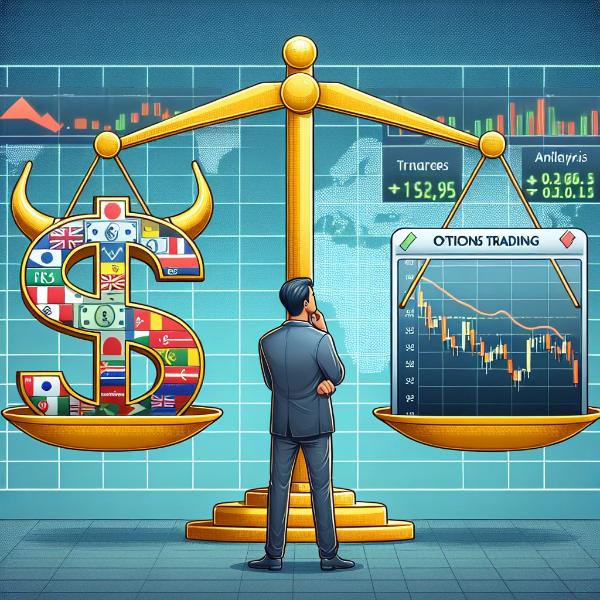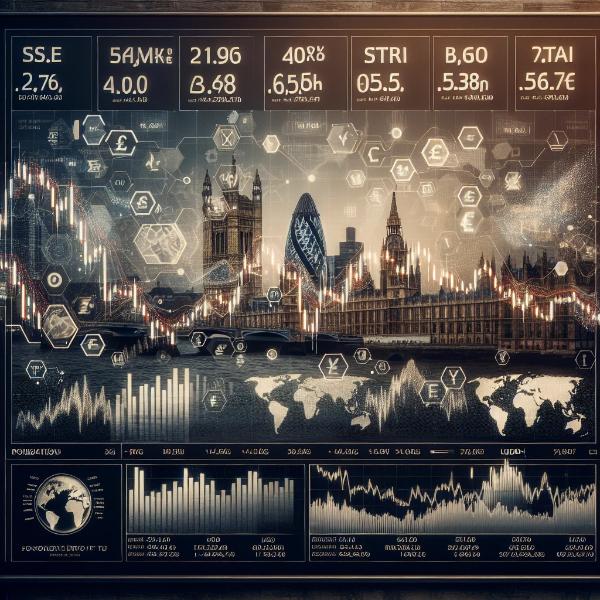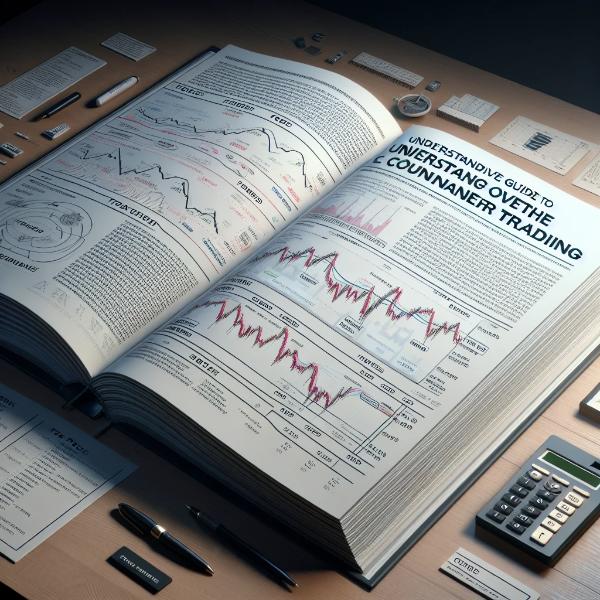Forex Trading vs Options Trading Which is Right for You

Are you looking to venture into the world of trading but unsure which path to take? Forex trading and options trading are two popular choices, each with its own unique advantages and potential for profit. Understanding the differences between these two markets is crucial in determining which one is the right fit for you.
Forex Trading:
Forex, short for foreign exchange, is the largest and most liquid market in the world. It involves buying and selling currencies with the aim of making a profit from fluctuations in their exchange rates. Forex trading offers several advantages, including:
- Liquidity: With trillions of dollars traded daily, the forex market ensures high liquidity, meaning you can easily enter and exit trades at any time.
- 24/5 Market: Unlike other markets, forex operates 24 hours a day, 5 days a week, allowing you to trade at your convenience.
- Low Costs: Forex brokers typically charge low transaction costs, making it an affordable option for traders of all levels.
Options Trading:
Options trading involves buying and selling contracts that give you the right, but not the obligation, to buy or sell an underlying asset at a predetermined price within a specified time frame. Here are some key advantages of options trading:
- Flexibility: Options offer a wide range of strategies that can be tailored to your risk tolerance and market outlook.
- Limited Risk: Unlike forex trading, options trading allows you to define your maximum risk upfront, protecting you from unexpected market movements.
- Profit Potential: Options can offer significant returns, as they allow you to leverage your investment and benefit from price movements in the underlying asset.
Ultimately, the choice between forex trading and options trading depends on your trading goals, risk tolerance, and personal preferences. Whether you prefer the fast-paced world of forex or the strategic approach of options, both markets offer ample opportunities for profit. Take the time to educate yourself and consider seeking guidance from experienced traders to make an informed decision.
Understanding Forex Trading
Forex trading, also known as foreign exchange trading, is the buying and selling of currencies on the global market. It is the largest and most liquid financial market in the world, with an average daily trading volume of over $5 trillion.
The forex market operates 24 hours a day, five days a week, allowing traders to participate in trading activities at any time. Unlike other financial markets, such as the stock market, forex trading does not have a centralized exchange. Instead, it is conducted electronically over-the-counter (OTC), meaning that trades are executed through a network of computers rather than on a physical trading floor.
The main participants in the forex market are banks, financial institutions, corporations, governments, and individual traders. These participants engage in forex trading for various reasons, including hedging against currency fluctuations, speculating on price movements, and facilitating international trade and investment.
Forex trading involves the simultaneous buying of one currency and selling of another currency. Currencies are traded in pairs, such as EUR/USD (Euro/US Dollar) or GBP/JPY (British Pound/Japanese Yen). The exchange rate between the two currencies determines the value of the trade.
Traders can profit from forex trading by speculating on the direction in which the exchange rate will move. If a trader believes that the value of a currency will increase, they can buy it at a lower price and sell it at a higher price to make a profit. Conversely, if a trader believes that the value of a currency will decrease, they can sell it at a higher price and buy it back at a lower price to make a profit.
Forex trading offers several advantages, including high liquidity, low transaction costs, and the ability to trade with leverage. However, it also carries a high level of risk, as currency prices can be highly volatile and influenced by various economic and geopolitical factors.
To be successful in forex trading, it is important to have a solid understanding of fundamental and technical analysis, as well as risk management techniques. Traders should also stay updated on global economic news and events that can impact currency prices.
In conclusion, forex trading is a dynamic and potentially lucrative market that offers opportunities for traders to profit from currency price movements. However, it requires knowledge, skill, and discipline to navigate the market successfully.
Basics of Forex Trading
Forex trading, also known as foreign exchange trading, is the buying and selling of currencies on the foreign exchange market. The forex market is the largest and most liquid financial market in the world, with an average daily trading volume of over $5 trillion.
The main participants in the forex market are banks, financial institutions, corporations, and individual traders. Unlike other financial markets, such as the stock market, the forex market operates 24 hours a day, 5 days a week, allowing traders to trade at any time.
The basic concept of forex trading is to profit from the fluctuations in currency exchange rates. Traders aim to buy a currency at a low price and sell it at a higher price, or vice versa, in order to make a profit. The exchange rate between two currencies is influenced by various factors, such as economic indicators, geopolitical events, and market sentiment.
Forex trading involves trading currency pairs, such as EUR/USD, GBP/USD, or USD/JPY. Each currency pair represents the exchange rate between two currencies. For example, the EUR/USD currency pair represents the exchange rate between the Euro and the US Dollar.
Traders can speculate on the direction of the currency pair by either buying or selling it. If a trader believes that the value of the base currency will increase relative to the quote currency, they will buy the currency pair. Conversely, if they believe that the value of the base currency will decrease, they will sell the currency pair.
Forex trading offers several advantages over other forms of trading. It provides high liquidity, allowing traders to enter and exit positions easily. It also offers the potential for high returns, as the forex market is highly volatile. Additionally, forex trading allows traders to use leverage, which enables them to control larger positions with a smaller amount of capital.
However, forex trading also carries risks. The market can be highly unpredictable, and traders can incur significant losses if they do not manage their risks properly. It requires a solid understanding of technical analysis, fundamental analysis, and risk management strategies.
In conclusion, forex trading is a dynamic and potentially profitable form of trading. It offers the opportunity to profit from the fluctuations in currency exchange rates. However, it requires knowledge, skills, and discipline to succeed in the forex market.
Advantages of Forex Trading
Forex trading offers numerous advantages over other forms of trading, making it a popular choice for investors around the world. Here are some of the key advantages of forex trading:
1. High Liquidity: The forex market is the largest and most liquid financial market in the world, with trillions of dollars traded daily. This means that you can enter or exit trades at any time, without worrying about liquidity issues.
2. 24/5 Market: Unlike other financial markets that have limited trading hours, the forex market is open 24 hours a day, 5 days a week. This allows traders to participate in the market at their own convenience, regardless of their time zone.
3. Leverage: Forex trading allows you to trade on margin, which means that you can control a larger position with a relatively small amount of capital. This gives you the opportunity to amplify your profits, but it’s important to note that leverage can also increase your losses.
4. Diverse Trading Opportunities: The forex market offers a wide range of trading opportunities, with over currency pairs to choose from. This allows you to diversify your portfolio and take advantage of different market conditions.
5. Volatility: The forex market is known for its volatility, which means that there are plenty of opportunities for profit. Volatility can be both a blessing and a curse, as it can lead to significant gains or losses, depending on your trading strategy.
6. Transparency: Unlike other financial markets, the forex market is highly transparent, with real-time price quotes and execution. This allows traders to make informed decisions and react quickly to market changes.
7. Accessible to All: Forex trading is accessible to individuals of all backgrounds and experience levels. You don’t need a large amount of capital to get started, and there are plenty of educational resources available to help you learn and improve your trading skills.
8. No Commissions: Unlike other forms of trading, forex trading doesn’t involve any commissions or fees. Instead, brokers make money through the spread, which is the difference between the buy and sell price of a currency pair.
9. Risk Management Tools: Forex trading platforms offer a variety of risk management tools, such as stop-loss orders and take-profit orders, which can help you limit your losses and protect your profits.
10. Global Market: The forex market is a global market, which means that you can trade currencies from all over the world. This allows you to take advantage of global economic trends and events, and diversify your trading opportunities.
Overall, forex trading offers a range of advantages that make it an attractive option for investors. However, it’s important to remember that trading forex involves risks, and it’s essential to have a solid understanding of the market and develop a sound trading strategy.
Risks and Challenges in Forex Trading
Forex trading offers numerous opportunities for profit, but it also comes with its fair share of risks and challenges. It is important for traders to be aware of these risks and challenges in order to make informed decisions and manage their investments effectively.
1. Volatility: The forex market is known for its high volatility, which means that prices can fluctuate rapidly and unpredictably. This volatility can lead to significant gains, but it can also result in substantial losses. Traders must be prepared to handle these fluctuations and have strategies in place to mitigate risk.
2. Leverage: Forex trading allows traders to use leverage, which means that they can control larger positions with a smaller amount of capital. While leverage can amplify profits, it can also magnify losses. Traders must exercise caution when using leverage and ensure that they have a solid risk management plan in place.
3. Market Manipulation: The forex market is decentralized and operates 24 hours a day, which makes it susceptible to manipulation. Large financial institutions and market participants can influence prices and create artificial movements. Traders must be vigilant and stay informed about market news and events that can impact the market.
4. Lack of Regulation: Unlike other financial markets, the forex market is largely unregulated. This lack of regulation can expose traders to fraud and scams. It is important for traders to choose reputable brokers and conduct thorough research before engaging in forex trading.
5. Psychological Challenges: Forex trading can be emotionally challenging, especially during periods of losses. Traders must be able to control their emotions and stick to their trading plans. Discipline, patience, and the ability to handle stress are essential qualities for successful forex traders.
| Risks | Challenges |
|---|---|
| Volatility | Psychological Challenges |
| Leverage | Market Manipulation |
| Lack of Regulation |
Overall, forex trading can be a rewarding venture, but it is not without its risks and challenges. Traders must educate themselves, develop a solid trading plan, and continuously adapt to market conditions in order to succeed in the forex market.
Exploring Options Trading
Options trading is a popular financial instrument that allows investors to speculate on the price movement of an underlying asset without actually owning it. It offers traders the opportunity to profit from both rising and falling markets, making it a versatile and flexible trading strategy.
One of the key advantages of options trading is the ability to leverage your investment. With options, you can control a large amount of an underlying asset with a relatively small amount of capital. This allows traders to potentially amplify their returns, but it also comes with increased risk.
Options trading involves the buying and selling of contracts, which give the holder the right, but not the obligation, to buy or sell the underlying asset at a predetermined price within a specified time period. These contracts are known as options, and they come in two main types: calls and puts.
A call option gives the holder the right to buy the underlying asset at a specified price, known as the strike price, before the expiration date. This type of option is typically used when the trader expects the price of the underlying asset to rise.
A put option, on the other hand, gives the holder the right to sell the underlying asset at the strike price before the expiration date. This type of option is typically used when the trader expects the price of the underlying asset to fall.
Options trading also provides traders with a range of strategies to choose from, depending on their market outlook and risk tolerance. Some popular options strategies include buying calls or puts, selling covered calls, and using spreads.
It’s important to note that options trading can be complex and requires a good understanding of the market and the risks involved. It’s recommended to do thorough research and seek advice from a financial professional before getting started.
In conclusion, options trading offers traders a flexible and versatile way to profit from the price movement of an underlying asset. It allows for leverage and offers a range of strategies to choose from. However, it also comes with increased risk and requires a good understanding of the market. If you’re interested in exploring options trading, make sure to do your due diligence and seek professional advice.
Benefits of Options Trading
Options trading offers a range of benefits that make it an attractive investment strategy for many traders. Here are some of the key advantages:
- Flexibility: Options provide traders with the flexibility to customize their trading strategies according to their risk tolerance and investment goals. Traders can choose from a variety of options contracts with different strike prices, expiration dates, and underlying assets.
- Limited risk: Unlike other forms of trading, options trading allows traders to limit their risk by purchasing options contracts. Traders can define their maximum potential loss upfront, which can help protect their capital.
- Leverage: Options trading allows traders to control a large amount of underlying assets with a relatively small investment. This leverage can amplify profits if the market moves in the trader’s favor.
- Hedging: Options can be used as a hedging tool to protect against potential losses in other investments. By purchasing options contracts, traders can offset potential losses in their portfolio and minimize risk.
- Income generation: Options trading can be a source of regular income for traders. By selling options contracts, traders can collect premiums, which can provide a steady stream of income.
- Opportunity for profit in any market condition: Options trading allows traders to profit from both rising and falling markets. Traders can take advantage of bullish or bearish market conditions by buying or selling options contracts accordingly.
Overall, options trading offers traders a wide range of benefits, including flexibility, limited risk, leverage, hedging capabilities, income generation, and the opportunity for profit in any market condition. It is important for traders to understand the risks involved and to develop a solid trading plan before engaging in options trading.
Potential Drawbacks of Options Trading
While options trading can offer many advantages, there are also potential drawbacks that traders should be aware of:
- High risk: Options trading can be highly risky, especially for inexperienced traders. The value of options can fluctuate significantly, and traders can lose their entire investment if the options expire out of the money.
- Complexity: Options trading involves a complex set of rules and strategies. It requires a deep understanding of options pricing, volatility, and various trading strategies. Novice traders may find it overwhelming and difficult to navigate.
- Limited time frame: Options have an expiration date, which means traders need to be correct in their timing. If the underlying asset doesn’t move as expected within the given time frame, the options may expire worthless.
- Higher costs: Compared to other forms of trading, options trading can be more expensive. Traders may need to pay commissions, fees, and bid-ask spreads, which can eat into their profits.
- Emotional stress: Options trading can be emotionally challenging. Traders may experience fear, greed, and anxiety, which can lead to impulsive decision-making and poor trading outcomes.
It is important for traders to carefully consider these potential drawbacks and assess their risk tolerance before engaging in options trading. It is also advisable to seek professional advice and education to improve their chances of success in this complex market.
Making the Right Choice
When it comes to choosing between Forex trading and options trading, it is important to make an informed decision that suits your financial goals and risk tolerance. Both trading methods have their own advantages and disadvantages, so it is crucial to understand the differences before diving into the world of trading.
Forex trading offers the opportunity to trade currencies on the foreign exchange market. It is a highly liquid market that operates 24 hours a day, allowing traders to take advantage of global economic events and news. Forex trading offers high leverage, which means that traders can control large positions with a small amount of capital. However, it also comes with high volatility and risk, as currency prices can fluctuate rapidly.
Options trading, on the other hand, involves trading contracts that give the buyer the right, but not the obligation, to buy or sell an asset at a specific price within a certain time frame. Options trading allows for more flexibility and risk management, as traders can hedge their positions and limit potential losses. However, it requires a deeper understanding of options strategies and market dynamics.
When making the right choice between Forex trading and options trading, it is important to consider your trading style, financial goals, and risk tolerance. If you are comfortable with high volatility and have a strong understanding of global economic events, Forex trading may be the right choice for you. On the other hand, if you prefer more flexibility and risk management, options trading may be a better fit.
Ultimately, the right choice depends on your individual preferences and financial situation. It is recommended to educate yourself, seek advice from experienced traders, and start with a demo account to practice and gain experience before committing real capital.
Factors to Consider
When deciding between Forex trading and options trading, there are several factors that you should consider. These factors can help you determine which trading method is right for you and your financial goals.
1. Risk Tolerance: Consider your risk tolerance before choosing a trading method. Forex trading involves high levels of volatility and can result in significant losses if not managed properly. Options trading also carries its own risks, such as the potential loss of the entire investment. Assess your risk tolerance and choose a trading method that aligns with your comfort level.
2. Time Commitment: Evaluate the amount of time you can dedicate to trading. Forex trading requires constant monitoring of the market and quick decision-making. Options trading, on the other hand, allows for more flexibility as you can set specific expiration dates for your trades. Consider your schedule and choose a trading method that suits your time availability.
3. Financial Goals: Define your financial goals before making a decision. Are you looking for short-term gains or long-term investments? Forex trading offers the potential for quick profits but also carries higher risks. Options trading can provide more stability and a longer-term approach. Determine your financial goals and choose a trading method that aligns with them.
4. Knowledge and Experience: Consider your level of knowledge and experience in trading. Forex trading requires a deep understanding of global markets, economic factors, and technical analysis. Options trading also requires a certain level of knowledge, particularly in understanding options contracts and strategies. Assess your knowledge and experience and choose a trading method that matches your expertise.
5. Accessibility: Evaluate the accessibility of the trading method. Forex trading is available 24 hours a day, five days a week, allowing for constant trading opportunities. Options trading, on the other hand, may have limited trading hours and availability. Consider your preferred trading schedule and choose a method that offers the accessibility you desire.
6. Investment Capital: Determine the amount of capital you are willing to invest. Forex trading typically requires a larger initial investment due to higher leverage requirements. Options trading can be more flexible in terms of investment capital, allowing for smaller initial investments. Assess your investment capital and choose a trading method that fits your financial capabilities.
By considering these factors, you can make an informed decision on whether Forex trading or options trading is right for you. Remember to always do thorough research and seek professional advice before engaging in any form of trading.
Question-Answer:
What is Forex trading?
Forex trading is the buying and selling of foreign currencies on the foreign exchange market. Traders aim to profit from the fluctuations in exchange rates between different currencies.
What is options trading?
Options trading is a type of investment strategy where traders buy and sell options contracts. These contracts give traders the right, but not the obligation, to buy or sell an asset at a predetermined price within a specific time frame.
Which is more risky, Forex trading or options trading?
Both Forex trading and options trading carry their own level of risk. Forex trading involves the risk of currency fluctuations, while options trading involves the risk of the option expiring worthless. It ultimately depends on the trader’s strategy and risk tolerance.
Which market is more liquid, Forex or options?
The Forex market is generally considered to be more liquid than the options market. The Forex market is the largest financial market in the world, with high trading volumes and a large number of participants. Options, on the other hand, have lower trading volumes and may be less liquid.
What are the advantages of Forex trading over options trading?
Some advantages of Forex trading over options trading include 24-hour market access, high liquidity, and the ability to trade with leverage. Forex trading also allows traders to focus on specific currency pairs, while options trading requires traders to choose from a range of underlying assets.
What is the difference between forex trading and options trading?
Forex trading involves buying and selling currencies on the foreign exchange market, while options trading involves buying and selling options contracts that give the holder the right to buy or sell an asset at a specified price within a certain time frame.
Which market is more volatile, forex or options?
The forex market is generally considered to be more volatile than the options market. This is because currency prices can fluctuate rapidly due to various economic and political factors, while options prices are influenced by the underlying asset’s price movement.
Which market offers higher potential returns, forex or options?
Both forex and options trading can offer high potential returns, but it ultimately depends on the individual trader’s skills and strategies. Forex trading allows for leverage, which can amplify profits, but also increase losses. Options trading can provide significant returns if the trader correctly predicts the price movement of the underlying asset.
Which market is more suitable for beginners, forex or options?
Forex trading can be more suitable for beginners as it offers a simpler trading structure compared to options trading. In forex trading, traders mainly focus on currency pairs and their price movements, while options trading involves understanding options contracts and their various strategies.
Which market has lower transaction costs, forex or options?
Forex trading generally has lower transaction costs compared to options trading. Forex brokers typically charge a spread, which is the difference between the buying and selling price of a currency pair. Options trading involves paying a premium for the options contract, which can be higher depending on the volatility and time remaining until expiration.
What is the difference between forex trading and options trading?
Forex trading involves buying and selling currencies on the foreign exchange market, while options trading involves buying and selling options contracts that give the holder the right, but not the obligation, to buy or sell an underlying asset at a specific price within a specific time frame.
Which one is more suitable for beginners, forex trading or options trading?
Forex trading is generally considered more suitable for beginners because it is simpler and easier to understand compared to options trading. However, it is important to note that both types of trading involve risks and require a certain level of knowledge and experience.
Which one offers higher profit potential, forex trading or options trading?
Both forex trading and options trading offer the potential for high profits, but they also come with high risks. The profit potential in forex trading is typically unlimited, while options trading allows for the possibility of large profits through leverage and price movements in the underlying asset.
What are the main risks involved in forex trading and options trading?
The main risks in forex trading include currency fluctuations, leverage, and market volatility. In options trading, the risks include the potential loss of the premium paid for the options contract, as well as the risk of the underlying asset not moving in the desired direction within the specified time frame.
Which one requires more time and effort, forex trading or options trading?
Both forex trading and options trading require time and effort to be successful. However, forex trading generally requires more time and effort as it involves constant monitoring of currency markets and analysis of economic factors. Options trading, on the other hand, can be more time-efficient as it allows for the use of predetermined strategies and can be done on a part-time basis.






